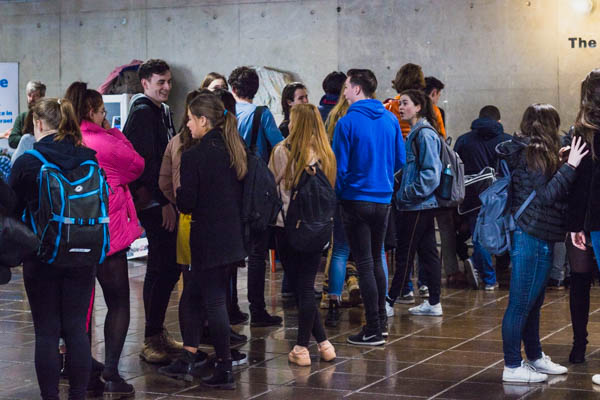Election season means different things to different people. For some, it’s the most important two weeks of the College year, as the fate of our union is hinged on the outcome of some lively hustings and a few days of voting. For others, it is something to be endured – two weeks of a busy Arts Block, bickering candidates, and endless manifestos.
So too with the campaigns themselves. In contested races, the countdown to polling can bear witness to bitter competition, as candidates bend over backwards to prove that they’re more suited to the job. In these races, voters are forced to become educated about candidates’ manifesto pledges, their suitability for the role, and even the functioning of the union itself. While there are no doubt students who vote on a hunch, ignoring the campaigning period and all it entails, there is at least some element of having to choose – of having to pick who should be the next union officer, whether you care or not.
This is, of course, not the case with uncontested races. This year, three races have only one candidate – welfare, communications and marketing, and Editor of The University Times. While the Editor race generally goes without contestation, more surprising are the other campaigns. Last year saw three candidates battle it out for the communications and marketing position, making this year’s one-horse race a major step down. Welfare, previously one of the most coveted positions on the union, seems to be experiencing something of a drought, going uncontested for the second year running.
This has implications for how election season pans out. There is a sense, it must be said, that candidates in uncontested races have to work less than their counterparts who face opposition. With no-one to challenge them, or offer an alternative, candidates can, to an extent, rest on their laurels, confident in the fact that reaching their electoral quota is safely in their grasp.
Evidence of such complacency is glaring in this year’s uncontested races. While Donal MacNamee has run a vocal and professional campaign for The University Times’s editorship, questions have been raised about whether the lack of opposition is good for the paper – an objection that has become a staple at hustings in recent years. Communications and marketing candidate Muireann Kane has run a noticeably low-key campaign, initially refraining from set up a Facebook page and failing to publish an accessible version of her manifesto. Sole welfare candidate Aisling Leen, meanwhile, has also struggled with certain questions at hustings, athough she has come into her own as the week has progressed.
If uncontested candidates feel like they actually have to win over votes, rather than merely show up on count night, the inevitable result is that they will improve their campaigns
It doesn’t have to be this way. As always, instead of voting for the uncontested candidates, students can vote to re-open nominations or RON, as it’s colloquially known. This would trigger a by-election later in the year, giving other potential candidates the ability to put themselves forward for the role. The problem with putting our hopes in RON, however, is simple: RON never wins.
While every year there is a push from some quarters to increase RON’s vote share, with this option even overtaking some presidential candidates in last year’s polls, there is a sense among many voters that re-opening nominations is not something that could ever actually happen. To many, it is at best a protest vote, at worst merely another option on the ballot box. To most, RON is seen less as a legitimate option, and more as a quirk of the union’s electoral system.
But RON could – and should – be an option. This viewpoint, once one of the hotter takes on campus, is thankfully starting to become normalised. The RON for TCDSU Comms campaign, launched by students this week to oppose Kane’s candidacy, has picked up significant steam, making the Communications and Marketing race feel like exactly that – a race.
It doesn’t have to be this way. As always, instead of voting for the uncontested candidates, students can vote to re-open nominations or RON
Students’ motives for setting up this campaign may have been slightly disingenuous, with the campaign accused of being a personal attack on Kane, but the core sentiment – that RON is not a wasted vote – is timely. For once, RON could actually win, putting the pressure on uncontested candidates to actually fight for the role. It’s worth noting that Thursday’s Media Hustings, which took place in the wake of the RON campaign’s publicity, saw both Kane and Leen on sharper form.
Importantly, RON doesn’t actually need to win to institute a change in union politics. All it takes is a culture shift. If uncontested candidates feel like they actually have to win over votes, rather than merely show up on count night, the inevitable result is that they will improve their campaigns, or suffer the consequences. The threat of a RON landslide, something that is finally starting to feel like a possibility, is hopefully enough to convince candidates to put the effort in. With any luck, such a culture shift would see uncontested candidates approaching a re-open nominations vote as if they had a real person running against them rather than a formality they were expected to beat.







